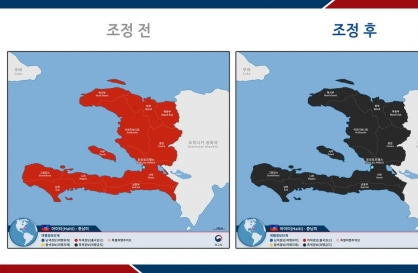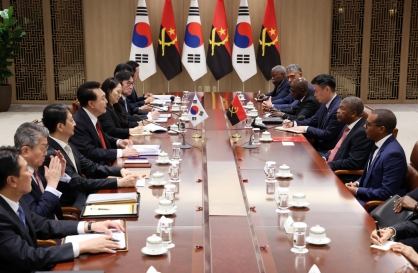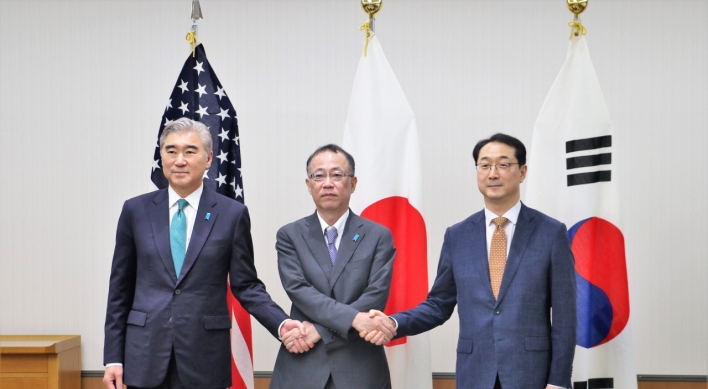Reality TV star publishes his memoir in Korea
It’s hard to imagine Korean-American reality TV star and former lawyer Yul Kwon being timid and quiet as a child.
But his latest Korean-language memoir reveals something that most of the public, well-aware of Kwon’s academic and professional triumphs, would find a surprise.
The 2006 “Survivor” winner and Yale Law School graduate said he had severe social anxiety disorders as a child, and was very often a target for bullying, in the book titled “I Evolve Every day.”
“What I want to tell people and help them understand is that I struggled as well,” said Kwon during a press conference promoting his book in Seoul last week.
“And my hope is that the young people who’ll read my book will understand that they are not alone if they are struggling and that the can change and be happy.”
In the book, Kwon reveals that his childhood anxiety disorder was so severe that he’d wash his hands until they’d bleed. He also writes that he had a fellow student urinate on him in a school bathroom while being bullied, and was ashamed of his Korean heritage unlike now.
“I was embarrassed whenever my parents spoke Korean in public,” writes Kwon in the book.
It’s hard to imagine Korean-American reality TV star and former lawyer Yul Kwon being timid and quiet as a child.
But his latest Korean-language memoir reveals something that most of the public, well-aware of Kwon’s academic and professional triumphs, would find a surprise.
The 2006 “Survivor” winner and Yale Law School graduate said he had severe social anxiety disorders as a child, and was very often a target for bullying, in the book titled “I Evolve Every day.”
“What I want to tell people and help them understand is that I struggled as well,” said Kwon during a press conference promoting his book in Seoul last week.
“And my hope is that the young people who’ll read my book will understand that they are not alone if they are struggling and that the can change and be happy.”
In the book, Kwon reveals that his childhood anxiety disorder was so severe that he’d wash his hands until they’d bleed. He also writes that he had a fellow student urinate on him in a school bathroom while being bullied, and was ashamed of his Korean heritage unlike now.
“I was embarrassed whenever my parents spoke Korean in public,” writes Kwon in the book.

“I hated the fact that my mother would prepare something so strange like ‘kimbab’ for my lunch. I was ashamed of myself for looking so different from the rest of white kids in the neighborhood.”
He decided to change while attending middle school, through the help of two close Asian-American friends who would always stand up for themselves against all forms of prejudice. In spite of his difficult childhood, Kwon eventually entered Stanford University majoring in Symbolic systems. He continued his studies at Yale Law School, and worked as an editor for the Yale Law Journal. Before appearing on the popular U.S. TV show “Survivor,” Kwon worked for a variety of professional fields, including law, government, and technology.
Kwon recently finished hosting PBS’ mini documentary series titled “America Revealed,” which deals with American manufacturing and agriculture.
“The reason why I wanted to host the show was because it was the first time that a national show about America was hosted by an Asian-American man,” Kwon told reporters.
“And I really thought this was something that can help improve the profile and image of Korean-Americans in America.
“There is this word called ‘perpetual foreigner,’” he continued.
“That means because we Asians don’t look white and don’t look black, people always assume that we are foreigners. Even if you were born in the U.S., raised in America and educated in America, you are always assumed not to be American. So I thought going on the show would change that stereotype.”
During the press conference Kwon said he is close with Amy Chua, a Chinese-American law professor at Yale whose 2011 parenting memoir “Battle Hymn of the Tiger Mother” became a controversial hit globally. He also said one of his greatest regrets is not having mastered Korean to the level he wants.
Kwon is currently married to Sophie Tan, a Taiwanese American, and welcomed his first daughter, Genevie, in 2010.
“Getting married and having a daughter is just the most wonderful experience of my life,” he said.
“I’ve always thought that I wanted to be a better husband and father first ― before my career. I very much think, at the end of my life, on my death bed, I can look back on my life and have to realities. In one reality I was be very successful; I achieved all of my professional ambitions.”
“But If I wasn’t a good father and I wasn’t a good husband, I don’t think I’ll die happy. But if it was the other way around ― I wasn’t as successful as I could’ve been, but if I felt like I was a good husband and a good father to my children, I think I’ll be happy.”
By Claire Lee (dyc@heraldcorp.com)


















